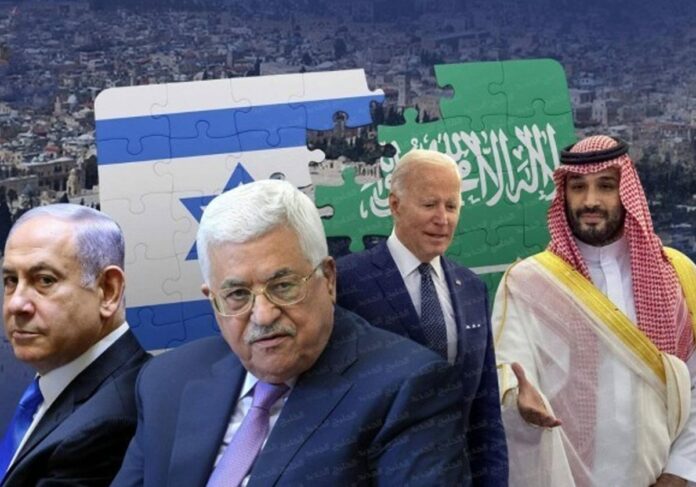Ahmed Matar – Researcher
Introduction
On September 15, 2020, the UAE, Bahrain, and Israel signed a peace agreement in the White House under American auspices, within the so-called Abrahamic agreements, which were the first normalization agreement with (Israel) after the Camp David agreement in 1977 and the Wadi Araba agreement in 1994.
It is no secret that both the United States and Israel hoped that Saudi Arabia would join the Abrahamic agreements, complementing the cordon that Tel Aviv was seeking to impose on Tehran in its quest to isolate the latter because of its nuclear program, as well as the shadow war taking place between Tehran and Tel Aviv. However, the Kingdom of Saudi Arabia preferred to wait for several reasons, the most important of which is that the relationship between Washington and Tehran had deteriorated to the extent that Riyadh was shocked by the failure of Washington to do anything after the exposure of Aramco facilities in 2019 to drone attacks, Riyadh accused Tehran of responsibility for it, and therefore Riyadh wanted to use normalization to impose its conditions, especially those related to obtaining security guarantees from Washington that earns Riyadh the status of a strategic ally, obtaining a civilian nuclear program with American support, and the need to implement a two-state solution to the Palestinian-Israeli conflict.
Recently, leaks and reports have begun to be repeated, as well as press meetings indicating that Riyadh and Tel Aviv are close to signing a peace agreement culminating in months of talks between the two parties through US mediation, starting with leaks published by the Wall Street Journal on 7/6/2021 about the involvement of Tel Aviv and Riyadh in talks that included the economic and security fields, and ending with the meeting of Saudi Crown Prince Mohammed bin Salman with Fox News on 20/9/2023, in which he stated that the agreement between Tel Aviv and Riyadh “will be the biggest transformation since the end of the Cold War.” Because of the issue’s importance for the Middle East, we will try to answer the questions centered on the possibility of achieving normalization soon. And what are the reasons why Washington, Riyadh, and Tel Aviv rely on normalization between the last two? And what are the expected repercussions of Saudi-Israeli normalization on the region?
First: the path to normalization.
If there is something that counts for the Madrid (1991 and Oslo 1993) Camp David Peace Summits, is that it brought together for the first time between Arab and (Israel) parties at the negotiating table openly and officially on the one hand, and the other hand, it revealed Israel’s unwillingness to achieve a just peace that gives the Palestinians their right to establish their independent state, which was revealed by (Israeli) behaviors that contradict American efforts to achieve peace between the Palestinians and (Israel). On September 28, 2000, then (Israeli) opposition leader Ariel Sharon stormed the Al-Aqsa Mosque under the protection of about two thousand soldiers and special forces. With the approval of then-Prime Minister Ehud Barak, clashes took place between the worshippers and the (Israeli) occupation forces, so the second uprising was launched.
The second uprising, compared to the first (1987-1993), was characterized by many confrontations and the escalation of military actions between Palestinian factions and the Israeli army. Palestinian factions also carried out attacks inside Israeli cities, aimed at blowing up restaurants and buses, killing hundreds of Israelis.
In light of the escalation of confrontations between Palestinians and (Israelis), King Abdullah bin Abdulaziz, who was then crown prince, put forward a peace initiative to resolve the conflict between the Palestinians and (Israelis) adopted by the Arabs at the Beirut Summit in 2002 and became known as the (Arab Peace Initiative), which does not differ in its contents from the King Fahd Peace Initiative of 1981, which was withdrawn in the same year as a result of its rejection by several Arab countries and (Israel). King Abdullah’s 2002 initiative aims to establish a Palestinian state, return refugees, and withdraw from the Arab territories occupied after 1967, including the Golan Heights, in exchange for peace with Israel.










